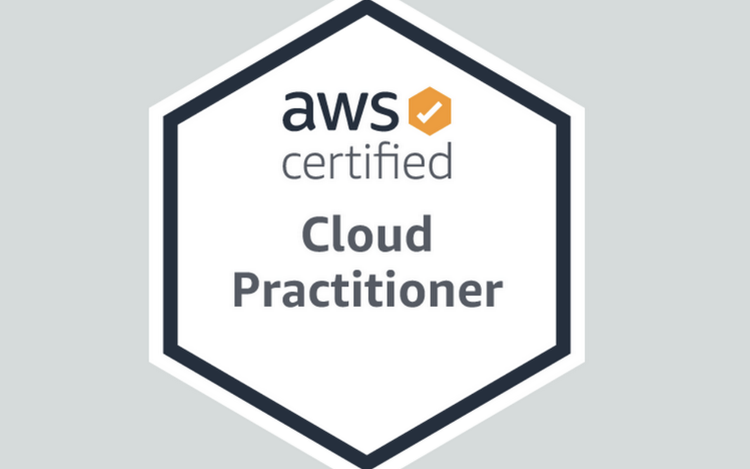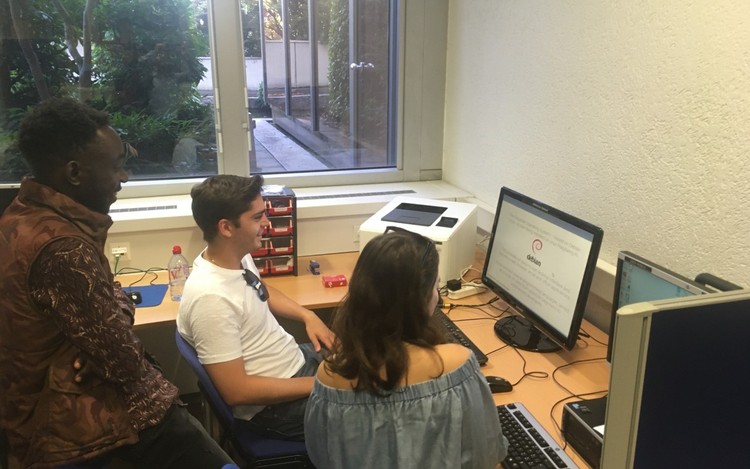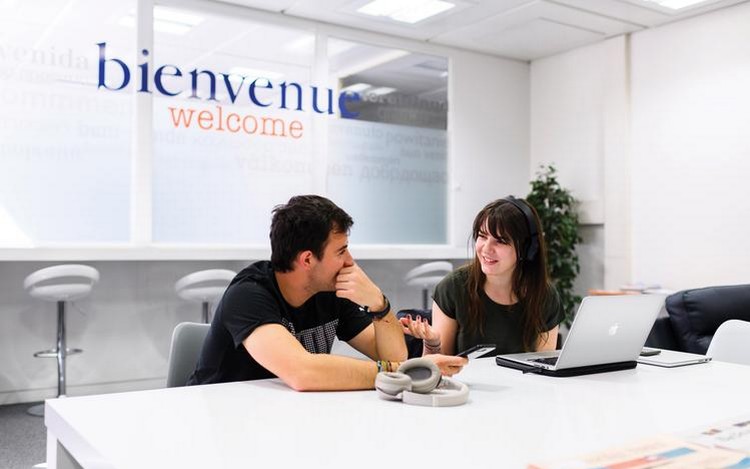Description des cours
-
TEC 102 – Application of Information Processing This course covers advanced information technology concepts and terminology and introduces students to the use of software tools for business applications. It provides a thorough presentation to the use of spreadsheets from basic navigation to building financial models including introduction to database management systems.6.00
-
ECO 235 – Economics This course introduces students to the role of supply and demand in determining market prices. The importance of consumers and firms on supply and demand is emphasized.6.00
-
FR B – French The objective of the course is to acquire a basic knowledge of French. At the end of term, students should have a basic understanding of French and be in a position to communicate in a simple way.6.00
-
PSY 223 – Social Psychology This course is designed to provide students with a general introduction to Social Psychology. Students will analyse the structures and properties of human groups and understand how they influence individual behaviour and vice versa. Topics include group dynamics, development of role relationships, development of attitude and prejudice, persuasion and propaganda and application of principles and theories of social psychology in everyday life.6.00
-
MKG 115 – Fundamentals of Digital Marketing The course provides students with an introduction to all basic principles and concepts of Marketing. It covers the marketing mix, the value creation, customer satisfaction and loyalty. It also covers direct and on-line marketing.6.00
-
MGT 100 – Principles of Management The course introduces the basic concepts, theories and principles on how a company/organization functions today. Students will learn the challenges modern managers face in running their departments and the company overall. It emphasizes how to make decisions, set objectives, budget and allocate resources, recruit the right people, plan and control in a modern company/organization.6.00
-
FIN 201 – Essentials of Finance This course is an introduction to the basic principles of finance. It covers financial mathematics, valuation approaches for different financial instruments, the appraisal of capital investment projects and the measurement of financial risk.6.00
-
CPS 207 – Creative Problem Solving Creative Problem Solving is a course designed to assist students in analyzing case studies from simple to complex. Using a variety of problem solving techniques, students will learn how to reach the best solution using the sixth step problem solving process.6.00
-
ENV 141 – Sustainability and Development Sustainable Development is a course that demonstrates the need for examining the linkages among economic, social, technological, and environmental issues in achieving a sustainable global society. Building on the multi-disciplinary nature of environmental studies, the course incorporates various aspects of economics, social engineering, ethics, politics, and science. The course discusses strategies, legislations, innovations and best practices for more sustainable economies in the future.6.00
-
STA 243 – Introduction to Statistics & Probability The course builds upon and expands the knowledge acquired in mathematics by introducing statistical methods such as inference, intervals of confidence, hypothesis testing and multiple regression technique.6.00
-
ACC 105 – Fundamentals of Accounting This course describes the fundamentals of accounting, the objective is to familiarize students with the use of financial statements, journals, ledgers and business transactions.6.00
-
CSC 210 – Management Decision Making The goal of this course is to introduce students to how decision analysis and processes are carried out in businesses and how data is used to improve performance and make better decisions at all levels of organizations. Students will also have the opportunity to practice the concepts/methods learnt through hands-on exercises using some commercial applications/tools.6.00
-
LAW 205 – International Commercial Law The purpose of this course is to provide students with an introduction to international business and commercial law. The study of torts, contracts and business organizations are covered, together with sales transactions, licensing and foreign direct investment (notably franchising and joint ventures). Key concepts of international litigation and trade/WTO law are included, with current controversies in Intellectual property and digital media regulation highlighted.6.00
-
COM 220 – Communication Skills This course examines the strategies and skills necessary to make successful business presentations. Students will develop their communication skills and examine the components of informative and persuasive presentations, both written and oral.6.00
-
MGT 250 – Entrepreneurship Students will be exposed to all aspects of the entrepreneurial process. This will include a discussion of what makes an entrepreneur – external environment and personality characteristics. Assembling resources, launching the business and harvesting rewards will also be discussed. Several sessions will be devoted towards writing the business plan.6.00
-
MGT 320 – Operations and Project Management This course provides the knowledge and skills required to manage complex global supply chains. Global supply chain management involves coordinating and streamlining the flow and transformation of goods, services, information and funds within companies around the world to maximize customer value and gain a competitive advantage in the global marketplace.6.00
-
MGT 305 – Human Resources Management This course provides an introduction to key HRM functions found in modern organizations such as: effective job design, staff selection, evaluation, reward systems, management development and organizational training.6.00
-
MKG 235 – Strategies for Brand Building This course is a first-level course in branding aimed at providing students with the necessary foundation to develop the logic behind the systematic brand planning model. It provides students with an introduction to branding and will cover key steps of the strategic brand building from Analysis to Implementation6.00
-
COM 320 – Public Relations & Advertising In this practice-oriented course students will learn about the two principal strategic communications tools for brand-building, reputation management and stakeholder communication employed by organizations: public relations and advertising. Students will gain a thorough understanding of communications campaigns from research to planning and from implementation to results evaluation, both from the corporate perspective and also from the perspective of communications agencies working on behalf of corporate clients. Students will also gain insights into special disciplines such as media relations, sponsoring, event management, corporate communications, employee communications, public affairs or investor relations.6.00
-
FIN 315 – Financial Management The course covers financial analysis tools used for evaluating corporate performance and forecasting future financial needs. It introduces techniques for managing working capital and optimizing the firm's long-term capital structure.6.00
-
IUG 3005B – Honours Project : Project Management Report Quantitative Methods (Plymouth) This module gives you the opportunity to investigate in-depth a specialist academic or practice-based topic for which you have a passion for knowing more within your field of study. The aim of the module is to facilitate investigation of a specific problem or area of study, enable synthesis of complex information and instil high level independent learning skills. This module focuses on helping students learn the basis of Qualitative data collection and analysis using qualitative data tools.6.00
-
IUG 3009 – Managing Change (Plymouth) The purpose of this module is to develop students’ knowledge of change within an organisational context and key issues involved in the management of change. The module will adopt a critical management perspective to examine and assess a number of change management models and concepts. The module will focus on three areas: the use of problem structuring methods to elicit and share knowledge, an understanding of business processes and, in particular, an awareness of the human resource constraints in the achievement of effectiveness within organizations.6.00
-
IUG 3008 – Responsible Global Enterprise (Plymouth) This module will focus on the management of global enterprises in a responsible way. You will consider the various forces within the local and international environments that are likely to influence firms’ expansion activities, including location choice, entry mode, internationalisation patterns and growth strategies. You will also explore the pros and cons of globalization, the emerging trends in deglobalization, fair trade practices and responsible foreign direct investment (FDI). Finally, you will examine the costs and benefits of offshore outsourcing as a part of global supply chain management and in the context of corporate social responsibility (CSR).6.00
-
CSC 495 – Generative AI in Business Generative AI (GenAI) is transforming the way businesses operate—accelerating content creation, automating knowledge work, personalizing customer experiences, and driving product and service innovation. This module introduces students to the business potential of GenAI through a managerial lens, examining strategy, digital transformation, governance, and ethical implications. Students will gain hands-on experience with leading GenAI tools and apply them to practical business scenarios such as recruitment, customer service, marketing content creation, innovation ideation, and automated workflows. Weekly case studies and guided exercises will ground theoretical concepts in real-world practice. By the end, students will be equipped to critically assess and responsibly apply GenAI to create value in a rapidly evolving business landscape.6.00
-
MKG 310 – Marketing Strategies Based on intensive case studies where the student will come face-to-face with real-life marketing decisions and will be expected to analyse cases. Emphasizes the process of marketing decision-making, marketing strategy development, and strategic planning.6.00
-
IUG 3005A – Honours Project : Project Management Report Qualitative Methods (Plymouth) This module gives you the opportunity to investigate in-depth a specialist academic or practice-based topic for which you have a passion for knowing more within your field of study.The aim of the module is to facilitate investigation of a specific problem or area of study, enable synthesis of complex information and instil high level independent learning skills. This module focuses on helping students learn the basis of Qualitative data collection and analysis using qualitative data tools.6.00
-
IUG 3006 – Strategy and Leadership (Plymouth) This module brings a problem-focused view to Strategy, Leadership and their interaction through Strategic Leadership. Particular consideration is given to strategic analysis, the development, evaluation and implementation of strategies and appropriate styles of leadership which facilitate this. The ethical and moral responsibilities of leaders will be critiqued, along with the development of relationships between organisational decision makers, leaders, and followers, within businesses.6.00
-
IUG 3007 – Enterprise, Innovation and Creativity (Plymouth) The aim of the module is to develop an understanding of the concepts of enterprise, innovation and creativity within the context of a variety of organisational and market settings. Students will learn about and apply creative processes to develop an innovative and viable business concept as well as evaluating the resourcing requirements of the proposed business concept (both financial and non-financial).6.00
-
CSC 350 – Data privacy, Protection and Governance This course is designed to help students with very little or no computing background learn the basics, key issues, and challenges in data privacy, protection and governance. This course will cover how managers can address these challenges across different types of organisation using relevant case studies and exercises.6.00
-
MGT 498 – Capstone The module will focus on the organisational structures and strategies appropriate to successful business management in a variety of different sectors and countries. It provides student with the opportunity to compare and contrast the practice of international strategic management in different business sectors, and within different cultural and economic contexts.6.00













